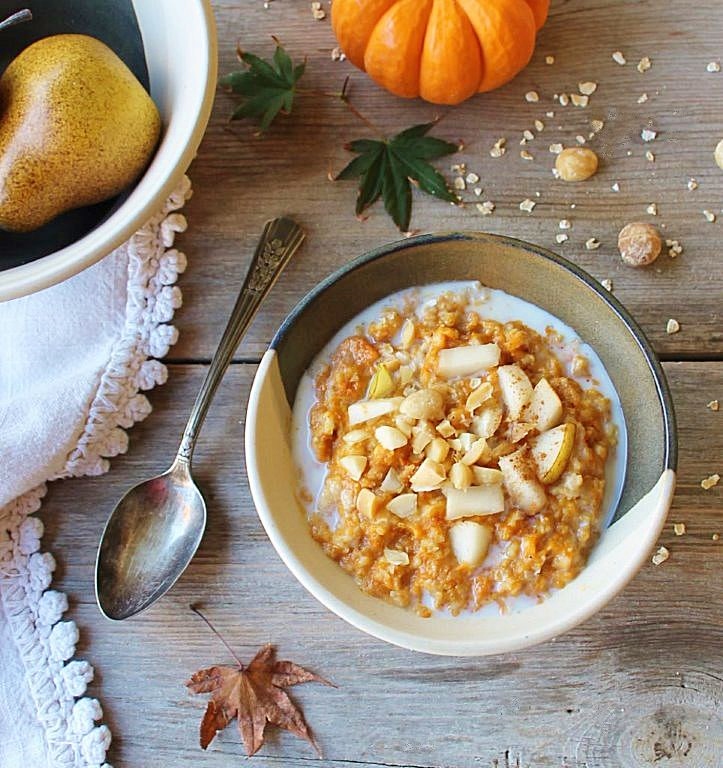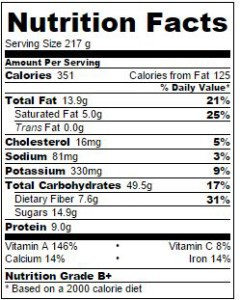Pumpkin Oatmeal with Macadamia & Beurre Noisette

Prep time
Cook time
Total time
A warm and nourishing autumn spiced oatmeal starring beurre noisette
Author: Kelly
Recipe type: Breakfast
Serves: serves 4
Ingredients
- 2 cups 100% whole grain oatmeal (steel cut or rolled) certified gluten-free
- 1 cup pumpkin purée (not the sweet pumpkin pie filling)
- 2 Tbsp pure maple syrup
- 2 Tbsp butter
- 1 tsp ground cinnamon
- ¼ tsp ground nutmeg
- ⅛ tsp ground ginger
- 1 ounce macadamia (about 8 nuts), chopped
- 1 pear, cubed
- 1 cup milk beverage of choice
Instructions
- Cook oats on stove top according to package directions.
- Meanwhile, in a separate small and sturdy pot, melt butter and continue to heat until it begins to froth (the milk product separating from the fat) and the butter turns brown, remove from heat immediately. Be sure to stir or whisk continually as you cook the butter and watch carefully for the color change, to prevent burning. Allow the beurre noisette to cool slightly.
- Add pumpkin purée to the beurre noisette as well as: maple syrup, cinnamon, nutmeg and ginger, mixing to combine (I like to use a small whisk). Sample and adjust seasonings as desired.
- Once oatmeal is cooked, divide among 4 bowls and swirl in ¼ portion of the pumpkin beurre noisette into each bowl. Top with milk, pear, a sprinkle of nuts and any other toppings as desired.
Notes
Steel Cut Oats vs Quick Cooking Oats: both steel-cut and rolled oats offer a good source of soluble fibre - the kind attributable to helping keep blood cholesterol in check. Whether you are choosing steel-cut oats (chopped into larger sizes and take longer to cook) or rolled oats ('old fashioned, quick-cooking oats' that have been rolled or flaked for easier cooking), be sure to choose 100% whole grain. Oats should have at least 3 grams of fibre per serving and ideally zero sugar and zero sodium.
Unsweetened Oats: buying the oats unsweetened allows you to decide how much and what type of sweetener you would like to add to your cereal, rather than the manufacturer. I am not a fan of instant oat cereals (powdered oats) because, even when they are 100% whole grain, these cereal packets almost always have sugar and sodium added to them.
Are Oats really Gluten Free? - pure oats do not contain gluten however many commercially sold oats do due to cross-contamination issues. If you are gluten sensitive or have celiac disease, be sure to seek out certified 'gluten-free' oatmeal.
Cinnamon: cinnamon is not only delicious it has also been shown to have a positive effect on blood glucose levels. Sprinkle cinnamon over your cereal or yogurt, adding it to smoothies, soups, stews and baked goods, as well as swirling it into tea and coffee.
Seasonings: "pumpkin spice" is always an option but if you're sulfite sensitive, you may wish to skip it (commercial brands commonly use the preservative) and simply create your own blend as I have done here. Pumpkin pie spice is generally made up of a combination of ground cinnamon, nutmeg, ginger and allspice but cinnamon/nutmeg will get you mostly there.

Unsweetened Oats: buying the oats unsweetened allows you to decide how much and what type of sweetener you would like to add to your cereal, rather than the manufacturer. I am not a fan of instant oat cereals (powdered oats) because, even when they are 100% whole grain, these cereal packets almost always have sugar and sodium added to them.
Are Oats really Gluten Free? - pure oats do not contain gluten however many commercially sold oats do due to cross-contamination issues. If you are gluten sensitive or have celiac disease, be sure to seek out certified 'gluten-free' oatmeal.
Cinnamon: cinnamon is not only delicious it has also been shown to have a positive effect on blood glucose levels. Sprinkle cinnamon over your cereal or yogurt, adding it to smoothies, soups, stews and baked goods, as well as swirling it into tea and coffee.
Seasonings: "pumpkin spice" is always an option but if you're sulfite sensitive, you may wish to skip it (commercial brands commonly use the preservative) and simply create your own blend as I have done here. Pumpkin pie spice is generally made up of a combination of ground cinnamon, nutmeg, ginger and allspice but cinnamon/nutmeg will get you mostly there.

Recipe by Inspired Edibles at https://www.inspirededibles.ca/2015/10/pumpkin-oatmeal-with-macadamia-beurre-noisette.html